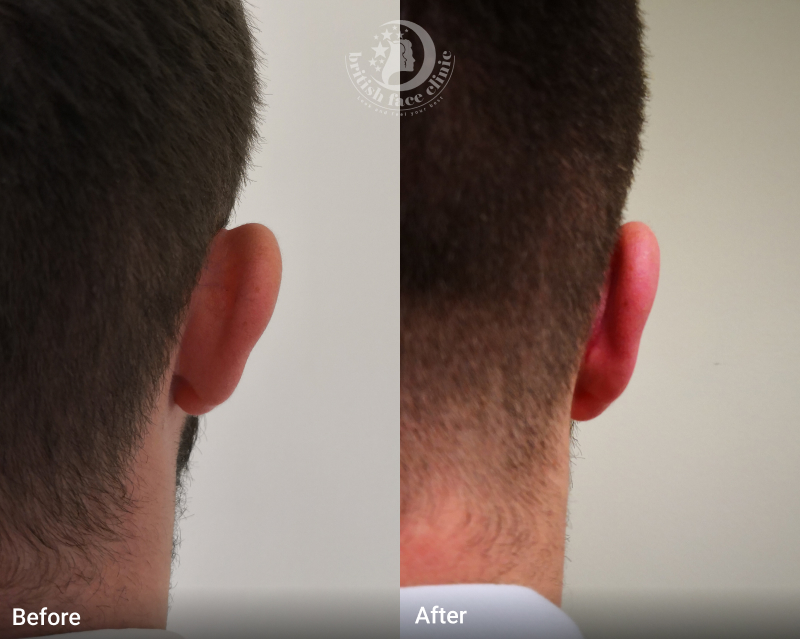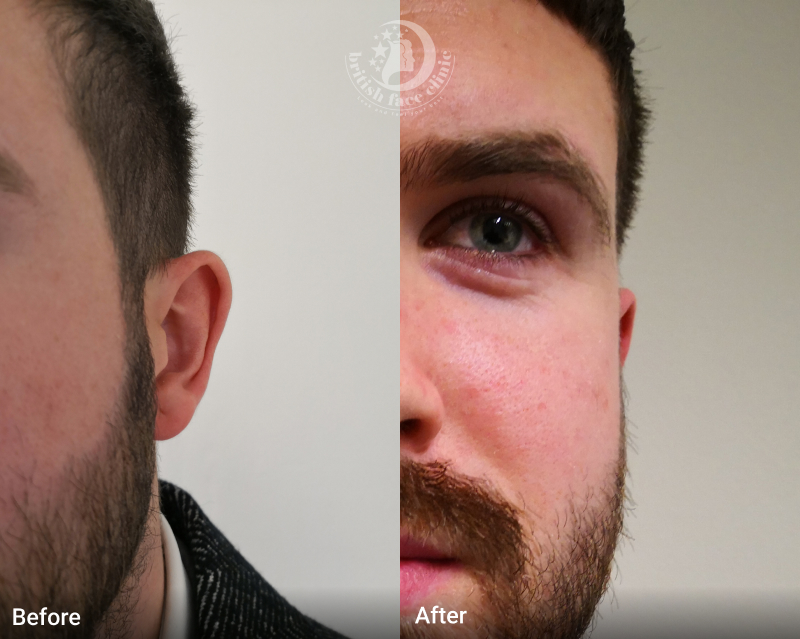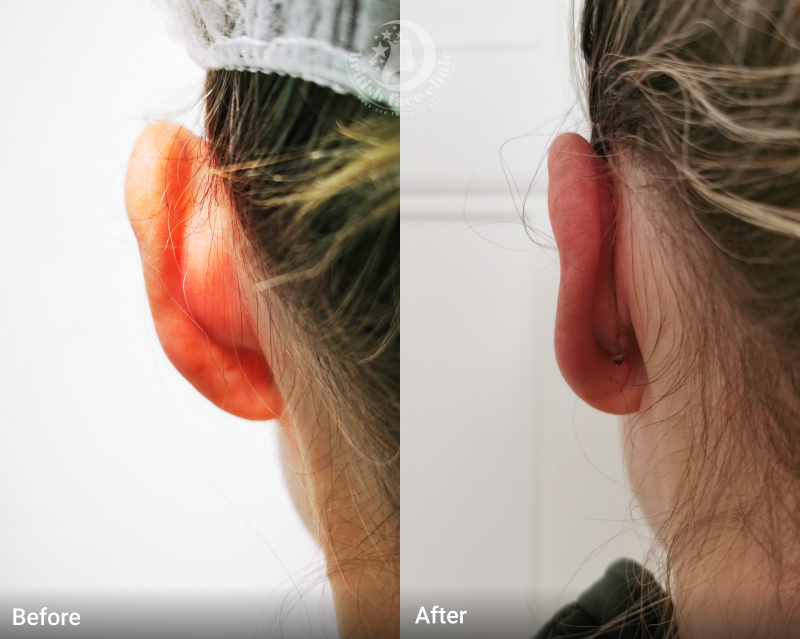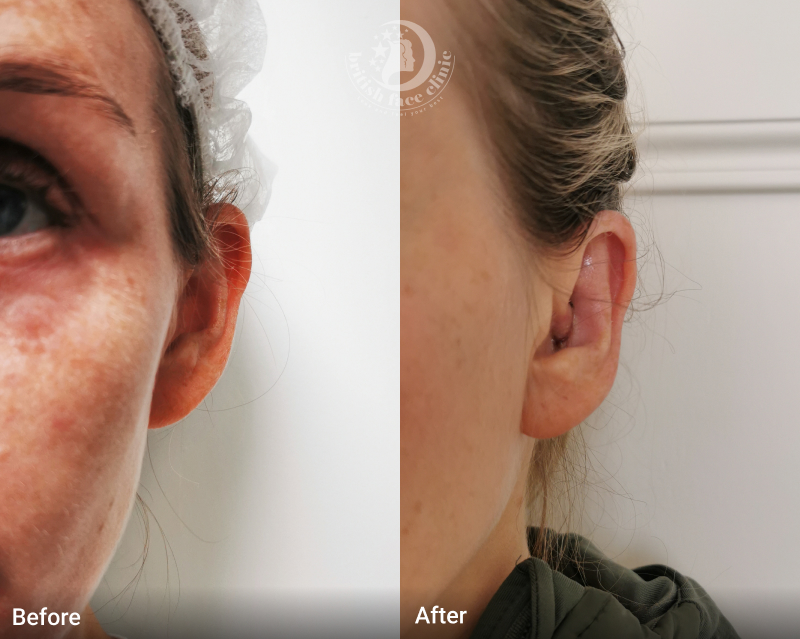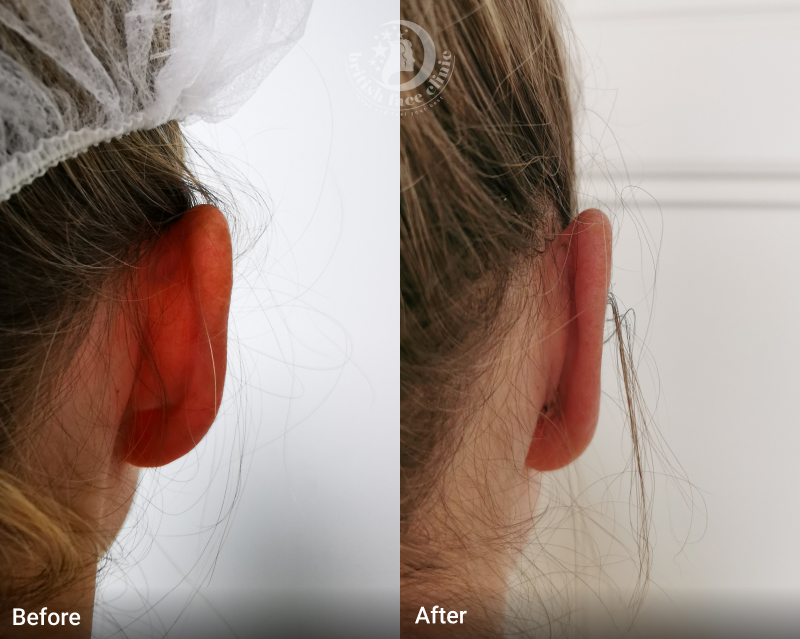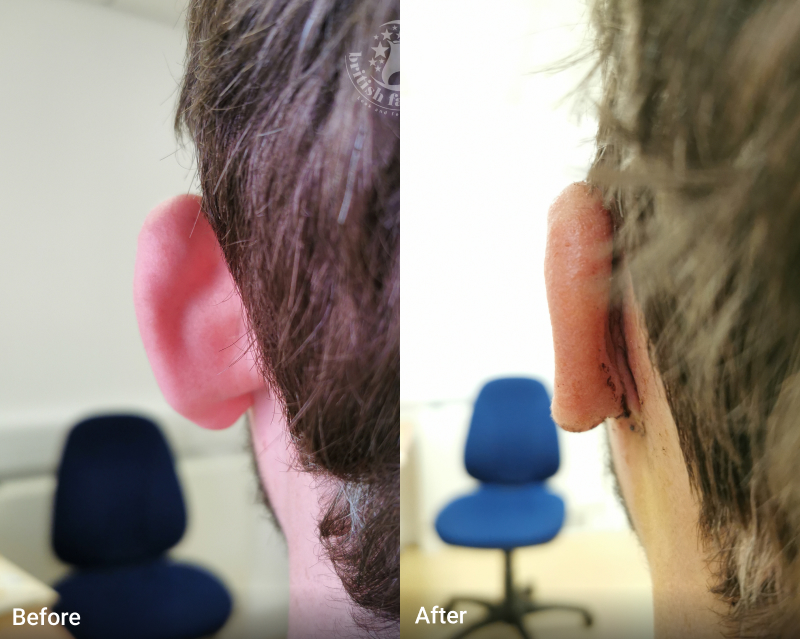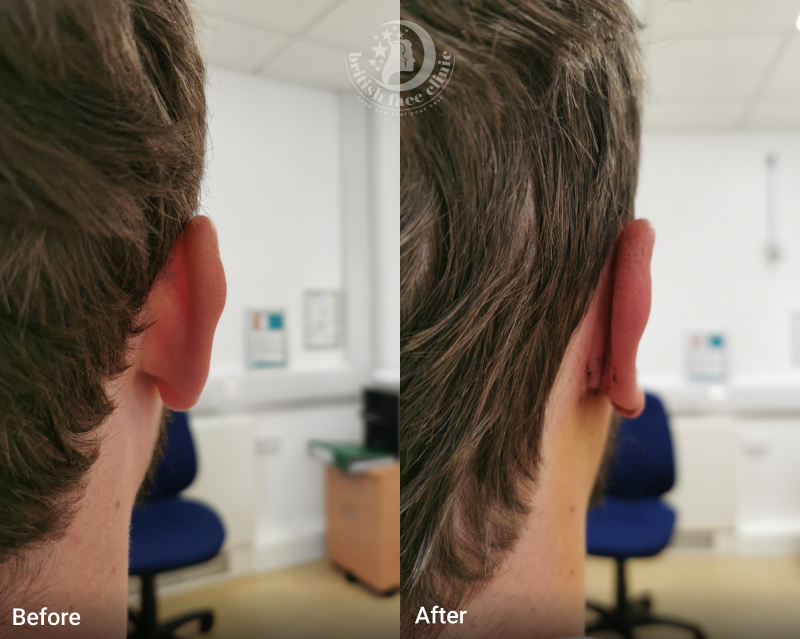Otoplasty (Ear Pinning Surgery) in London,
Milton Keynes, and Northampton
Otoplasty, pinnaplasty, or cosmetic ear surgery is a procedure performed to decrease the prominence of your ears. This is a very common cosmetic procedure that alters the projection of the ears so they are positioned closer to the head and are no longer sticking out.
Other procedures include changing the shape and size of the ears, or correcting misshapen ears due to an injury or birth defect.
To discuss Otoplasty with British Face Clinic call us on 07590817036.
See Before and After Pictures of Otoplasty
These before and after photos show the effectiveness of the
otoplasty performed by Mr Mrinal Supriya and his team.
The above pictures are authentic and unedited photos of Mr Supriya patients.
Why Undergo Otoplasty?
Patients with over projected ears often feel self-conscious about how their ears look. To compensate, patients will often adjust their hair to cover the ears whilst those with long hair may refrain from wearing their hair up.
By undergoing ear correction surgery the patient regains their confidence, which in turn improves their self-esteem.
Mr Supriya can also discuss altering the size and shape of the ear by reducing the ear lobe. Patients with large or misshapen ears can also experience low self esteem which is regained through corrective surgery.
How ear surgery works
- Mr Supriya performs Classical Otoplasty under a local anaesthetic, by making a hidden cut behind the ear. Through this cut, depending on the individual requirement, excess cartilage is removed and sutured back to improve the ear’s appearance and symmetry.
- You can look at the appearance and positioning of your ear whilst on the operating table before final closure; this is a key benefit and ensures Mr Supriya can make any desired alterations before concluding the procedure.
- Your ears will be bandaged with a dressing in and over the operated part. The bandage is typically removed after 4 (four) days, and you will be required to wear a headband for the following week. The dressing and sutures are removed after 7 – 10 days.
Otoplasty at a Glance
Duration
1 hour
Anaesthesia
Local anaesthetic

Hospital Stay
Daycase with no overnight stay

Full Recovery
6 – 9 months

Downtime
1 – 3 weeks

Exercise
After 4 weeks
Cost
Consultation – £100 Procedure from £5,500

Results
2 – 3 weeks
Duration
1 hour
Anaesthesia
Local anaesthetic

Hospital Stay
Daycase with no overnight stay

Full Recovery
6 – 9 months

Downtime
1 – 3 weeks

Exercise
After 4 weeks
Cost
Consultation – £100
Procedure from £5,500

Results
2 – 3 weeks
What are the advantages and disadvantages of ear surgery?
Advantages
- Lifelong results
- Self-confidence is restored
- We can achieve significant changes to the ear’s appearance
Disadvantages
- You need to wear a head bandage for 2 (two) weeks
- Your ear can be sore and tender during the first week
- Once the cartilage is removed it cannot be restored

Consultation
We offer a free initial phone consultation with our specialist team. For the next step, we invite you to an in-person or online consultation with Mr Supriya. Consultations are £100 with Mr Supriya and are deductible from any booked surgery. This fee includes follow-up consultations.
How do I prepare for ear surgery?
Our pre-operative guide helps ensure you get the best results from your otoplasty surgery. Taking Arnica tablets for 1 week before and 1 week after surgery can help reduce bruising and swelling.
Do not take aspirin or any drug that increases bleeding 2 (two) weeks before your surgery. If in doubt call our office. Also avoid herbal products such as Gingko, Garlic, or Ginseng. All of these products can be resumed 2 (two) weeks after surgery. If you take daily medications (for example: for your heart, blood pressure, etc.) you can continue to take them as you would but only with small sips of water to swallow them. The night before and the morning of your surgery wash your face, body, and hair with an antibacterial soap. Baby shampoo can also be used.
Remind your doctor and staff of any special concerns or conditions. Do not wear any skin products, moisturisers, makeup, lipstick, eyeliner, hair spray, nail polish or fragrances from the neck up. Patients with long hair should wear it back and tied up and should bring some hair clips on the day. Wear loose clothing, sweats or PJ’s and avoid wearing pull over tops (button-up or zip-up shirts).
You need to have someone to take you home following surgery and to stay with you. The length of time you need a caretaker is very individual, but we recommend for at least the first 24-48 hours.
Patient Stories
It’s embarrassing looking tired at work, and social events aren’t so fun when your confidence and self-esteem are lacking. You’ve neglected yourself and feel inadequate compared to all the beautiful people around you. You deserve some self-love.
Take your first step and step into a more beautiful you!

What result can I expect?
As part of your consultation, Mr Supriya will discuss in detail what your goals are and will develop a treatment plan with you to meet your expectations.
As the surgery is performed under a local anaesthetic, patients can see the results mid procedure before the bandage and dressings are applied. Pinnaplasty is a relatively straightforward procedure with great impact. There is a very low revision rate with Otoplasty as patients are generally very happy with the results.
Otoplasty Recovery Timeline
Following surgery at our private Otoplasty clinic patients understandably want to know what their final results will be. Our timeline below gives you a guide to when you will see and enjoy your results.
1st day post op
You may feel slight discomfort in the first 24 hours after surgery as the anaesthetic wears off. Paracetamol will help ease this. As your procedure is a daycase you will have been allowed home on the same day with a full head bandage applied.
1 week post op
It can take a few months for swelling to disappear and for patients to regain feeling in their ears. Patients are asked to continue to wear a headband at night for at least 2 (two) weeks after their bandages are removed.
Full recovery
It can take a few months for swelling to disappear and for patients to regain feeling in their ears. Patients are asked to continue to wear a headband at night for at least 2 (two) weeks after their bandages are removed
Ear surgery risks
- Infection
- Bleeding and hematoma
- Skin discolouration or partial necrosis
- Tender points / suture extrusion
- Minor asymmetry between the ears
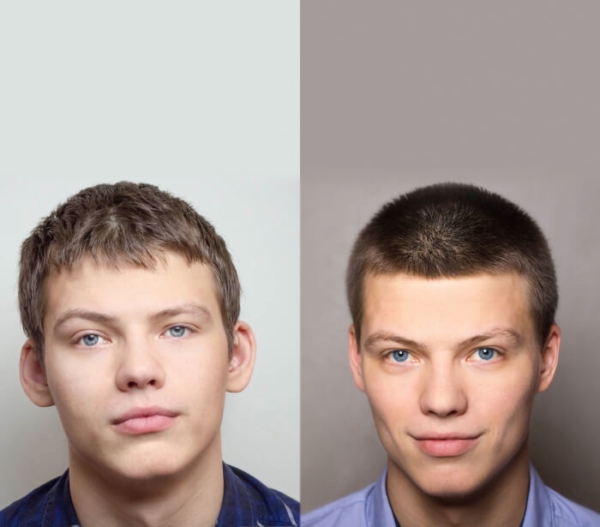
Tips for a Healthy Recovery
Regardless of the procedure there will be both physical and emotional issues to consider during recovery. It’s important to remember not to rush the healing process.
Here are some helpful hints for a healthy recovery.
- Ice or cold compresses can be used for the first 72 hours after surgery as it helps reduce swelling. Do not put bare ice on skin, always use paper towels or a wash cloth to protect skin from freezing or burns.
- Plan your recovery time smartly. Depending on the type of surgery, recovery time could range from a few days to a few weeks. Keep this in mind as it affects your work, family, and social schedules after surgery.
- Be realistic in your expectations. Let’s face it, you’re going to look worse before getting better. Just about all types of cosmetic surgery procedures involve bruising and swelling. Your real results won’t reveal themselves for a few days (or longer) so don’t panic. Let the natural healing process take place. If you suspect a problem, see your surgeon.
- Arrange for care for the initial 48 – 72 hours after surgery. Even though you may believe you can resume your normal routines, having someone there to assist you will bring peace of mind and allow the healing process to occur normally and with less disruption.
- Keep your head and neck elevated for a few days. This will help reduce swelling and speed the recovery process without compromising the results.
- Avoid exposure to direct sunlight. Use sun-block with proper UV protection to protect your skin.
- After surgery you will have open wounds and it is important not to expose these areas to sources of infection. Please do not hug or sleep with pets, sit in hot tubs, swim in ponds or lakes or otherwise expose yourself to germs.
- Consider taking Arnica tablets 1 (one) week before and 1 (one) week after surgery. This may help reduce swelling.
- Rehydrate your body often. Surgery of any kind can reduce fluids in your body. Drinking water frequently will help replenish these lost body fluids. Also, eat lightly for the first few days and only food that is easy to swallow and digest
Reclaim your youthful face. Reclaim your self-assurance.
Meet Mr Supriya - The Best
Choice for Otoplasty
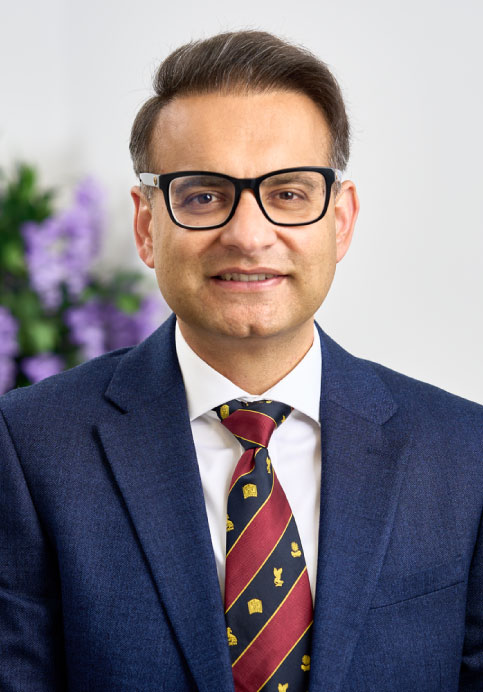
Meet Mr Mrinal Supriya | Facial Cosmetic Surgeon
FRCS (OTOL-HNS), MRCS Ed,
DO-HNS, MS in ENT, MBBS
Mr Mrinal Supriya is the Divisional Director of Surgery. He is highly experienced Head and Neck Surgeon, specialising in facial cosmetic surgery. He is Chief of Surgery Division (2024) and was the Clinical Director for head and neck surgery at Northampton General Hospital.
He leads complex ENT and head and neck services, including facial aesthetics & reconstruction and robotic surgery. Mr Supriya trained globally, including in the UK, Australia and the USA and worked with renowned experts like Dr Andrew Jacono. He is certified by The Royal College of Surgeons to provide facial cosmetic surgery in the UK.
Why Choose British Face Clinic for
Your Otoplasty Procedure?
- Focus on natural-looking outcomes and high patient satisfaction
- Benefit from Mr Supriya’s international experience
- Advanced surgical services led by Mr Supriya at a prominent NHS hospital
- Expertise in training Oxford Deanery Trainee Surgeons
- Address both cosmetic and medical issues with comprehensive care
- Exceptionally low revision rates
- Best possible support before, during and after surgery with dedicated team access
How to schedule a consultation
To schedule a consultation to discuss an otoplasty procedure, you can either call us on 07590817036, book online via our website, schedule a video consultation or visit us at one of our clinics in London, Milton Keynes, or Northampton.
What to Expect During
Your Consultation
During your full medical consultation, we’ll discuss:
- Your surgical goals
- Medical conditions, drug allergies and medical treatments
- Current medications, vitamins, supplements, alcohol, tobacco and drug use
- Previous surgeries
Our surgeon will:
- Evaluate your general health and risk factors
- Take photographs
- Discuss your surgical options
- Recommend a treatment course
- Discuss likely outcomes and potential complications
- Preview your surgical outcome with Crisalix 3D technology (for selected procedures)
- Discuss the surgery cost and payment options
Welcome Message from Nidhi,
Director at British Face Clinic
Holly, Practice Manager, Explains Why to Choose British
Face and What to Expect in the Procedure Cost
What is the cost
of Otoplasty?
At our private Otoplasty clinic, Otoplasty starts from £5,500 including all hospital, anaesthetist and surgical fees as well as your pre and post-operative care.
Accessible Payment
Plans Now Available
We make your procedure more accessible by offering flexible payment plans with 0% interest for the first 12 months!
It takes less than a minute to fill in the form and receive a response. Otoplasty has never been so accessible!
0% financing available

Change Your Life Today
Ready to take the next step toward achieving the look you desire? Book a personalised consultation at
our clinic today to discuss how otoplasty can help you achieve natural, confidence-boosting results.
Our Locations
- London City
The Wellington Hospital, 15 – 17 Lodge Road
London NW8 7JA
- London City
98 Harley Street
London, W1G 7HZ
- Milton Keynes
Athena Surgical Centre
16 Davy Avenue, Knowlhill
Milton Keynes, MK5 8PL
- Northampton
The Three Shires Hospital
The Avenue
Northampton. NN1 5DR
London City
The Wellington Hospital
15 – 17 Lodge Road
London NW8 7JA
London City
98 Harley Street
London, W1G 7HZ
Milton Keynes
Athena Surgical Centre
16 Davy Avenue, Knowlhill
Milton Keynes, MK5 8PL
Northampton
The Three Shires Hospital
The Avenue
Northampton. NN1 5DR


